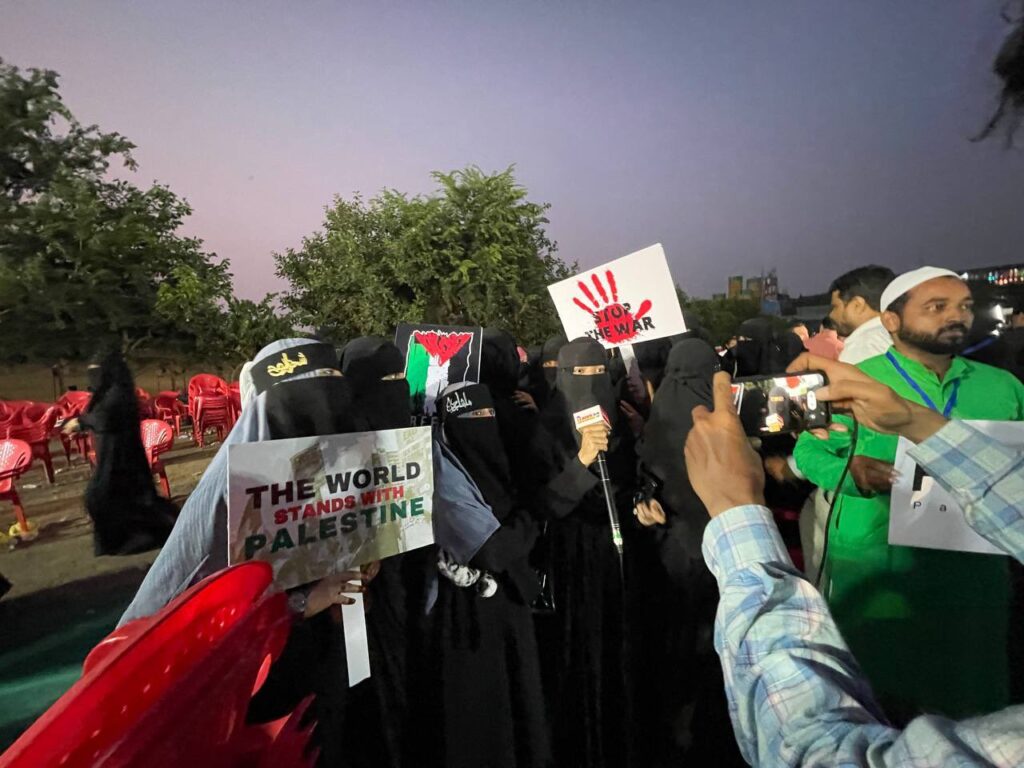Peace Meeting Held In Mumbai, Flays Israel For Massacre In Gaza Strip
Dec 11, 2023 | Pratirodh Bureau
Representatives of various religious communities came together last week in a Sabha at Mumbai's Azad Maidan to condemn the escalation of violence against Gaza, express solidarity with the people of Palestine and call for a permanent ceasefire (photo: @Prksh_Ambedkar/X)
As the conflict rages on in the Gaza Strip, thousands of people converged at the Azad Maidan in Mumbai last week to flay Israel and express support for Palestine, against whom huge atrocities continue to be committed. Organised by Vanchit Bahujan Aghadi, the gathering — Shanti Sabha — saw participation by representatives of different religions who joined up and declared solidarity with the Palestinians even as it slammed Israel for the continued attacks on Gaza Strip.
Among the speakers at the Peace Meeting was VBA president Prakash Ambedkar. Speakers adopted a resolution expressing deep concern and alarm over the ongoing genocide in Gaza Strip. It was signed by various religious delegates.
The resolution called on the Central government to condemn the attacks by Israel immediately, put a stop to the collective punishment imposed on civilians, show unconditional solidarity with Palestinians and implement a permanent ceasefire there.
The meeting took note of the fact that the bombarding of the Gaza Strip by Israel over the past 50 days had killed more than 15,000 people, including 10,000 children and women. This makes the ongoing massacre the ‘deadliest phase endured by the people of Palestine living in Gaza Strip’.
The resolution said, “Thousands have been displaced by the indiscriminate bombardment, water, food, medicine, fuel and electricity supplies have been restricted. There can be no justification for this massacre, which is a collective punishment.”
The Peace Meeting also objected to India’s decision to abstain from the 26 October United Nations General Assembly resolution, calling it ‘unprincipled’, especially since India has a long tradition of supporting the Palestinian cause. The resolution had called for a truce in Gaza.
The meeting noted how, ever since the beginning of the conflict, rallies in support of Palestine are constantly being met with a crackdown while pro-Israel rallies are being readily allowed.
The resolution noted, “The social media is rife with content and rhetoric dehumanising the Palestinian people or the unimaginable horrors they are going through, which have put a question mark on India’s values and foreign policy towards Palestine. Our diplomatic stance should change.”
As India has faced the cruelty of colonialism, the resolution urged India to unequivocally support Palestine and take up the mantle of peacemaker as the leader of the Global South.
The Peace Meeting called for providing humanitarian assistance to alleviate the sufferings of the Palestinians and made an 8-point appeal to the government of India. It also called for unconditional solidarity with Palestine, permitting protests against Israel’s dictatorship, end to domestic efforts aimed at criminalising Palestinians and a permanent shutdown in Gaza Strip.
The resolution signatories also sought protection and promotion of justice, accountability and fundamental human rights at the International Criminal Court in the Netherlands, promoting the two-country solution of peace and security that India has always espoused and using diplomatic and political influence to bring both Israel and Palestine to the negotiating table.
The Israeli–Palestinian conflict began in the mid-20th century and is one of the world’s longest-continuing conflicts. Various attempts have been made to resolve the conflict as part of the Israeli–Palestinian peace process, alongside other efforts to resolve the broader Arab–Israeli conflict. Public declarations of the desire to see a Jewish homeland established in Palestine, including the First Zionist Congress of 1897 and the Balfour Declaration of 1917, created early tensions in the region after waves of Jewish immigration.
